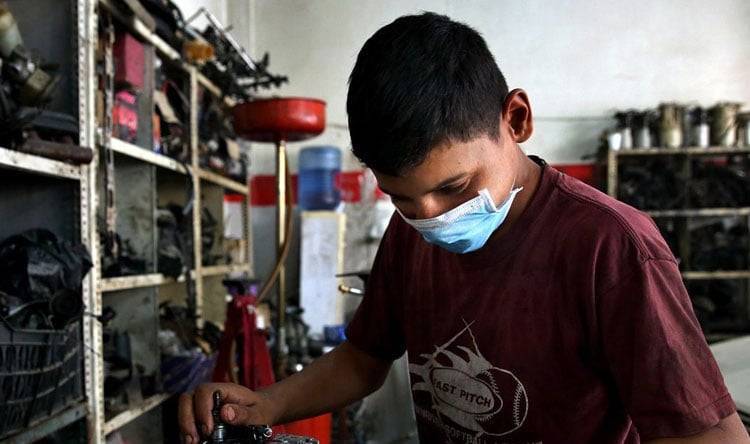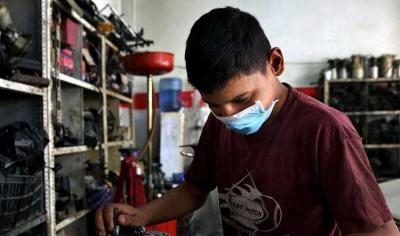The severe living and economic crisis has not spared poor and underprivileged families, extending its reach to teenagers and children who have entered the workforce early. Some of them have dropped out of school to help their families cope with the harshness and challenges of life. They have engaged in various professions, and those who couldn't find a job have innovated other ways, including selling goods from a mobile cart, whether it be vegetables, pastries, candies, or gifts.
In the commercial market of Sidon, siblings Ibrahim and Ali Nouri share the burden of seeking their daily livelihoods. They collect earnings together to support their family, which consists of seven members: their parents and three siblings—Haider, who has special needs, Hiba, and Mahmoud. The Syrian events have made them refugees in Lebanon several years ago.
Ibrahim, 12 years old, sells date-filled pastries from a mobile cart on Al-Shakiriyah street. He tells "Nada al-Watan": “My brother Ali and I decided to take responsibility. Our father is injured and cannot work, and our mother cares for the family. Living expenses are high. We live in a rented house in the villas area, and food and drink costs are very significant. We work to earn enough for our sustenance and avoid asking for help, as that is humiliating.”
Ali, 10 years old, sells toys and balloons from a cart beside his brother. He states to "Nada al-Watan": “We work from the early morning hours so that we can attend school in the afternoon. We believe that work alone is not enough; education is essential to change our situation for the better. However, life is harsh and spares no one. We fled toward safety only to fall under the weight of poverty and need.”
The siblings agree on rejecting the humiliation of asking for help and choose to work hard regardless of harsh conditions. They point to a needy person holding a doctor's prescription and asking for help and affirm, "Dignity comes above all else. We are living through an exceptional phase, and we are confident that everything will return to what it was, and we will return.”
In Sidon's market, specifically in Al-Shakiriyah, the voices of sellers intertwine—Lebanese, Palestinians, Syrians, and “Bedouins selling vegetables”—united by the pursuit of securing a livelihood to face the hardships of life. Lebanese vendor Khaled Belhass, who sells delicious sweets from a mobile cart, tells "Nada al-Watan": “The living crisis has generated an army of unemployed people, some of whom have taken the shortcut to work daily from a mobile cart, which remains better than unemployment. The economic distress has crushed poor classes, leaving them below the extreme poverty line, and regardless of what they do, they will continue to face intense hardship until further notice.”
Palestinian vendor Mohamed Bayoumi, who sells fruits from his cart, indicates, “The crisis has compounded people's suffering. Salaries have lost value against the rising prices and inflated dollar, so how about those unemployed? Consequently, there has been a decline in the demand for purchasing anything, including fruits, which some now consider a luxury or a kind of indulgence. Life requires struggle and endeavor to live with dignity, and we have adjusted our lifestyle and approach according to our most pressing priorities.”




